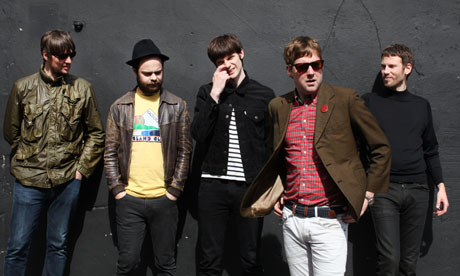In March 2005, Kaiser Chiefs released their first album, Employment. It had been preceded by a single, Oh My God, which had reached No 6 and was, in 2007, covered by Mark Ronson and Lily Allen on Ronson's debut album, Version. NME ranked it the 36th "greatest indie anthem ever", a decision that had presumably at one point not sounded quite so much like damning with the very faintest of praise. Another single, I Predict a Riot, followed the album's release and soon became the band's anthem. They won an Ivor Novello award for best album in 2006, and three Brit awards the same year (for best British band, best rock act and best new artist). To date, Employment has sold 2m copies. Its follow-up, Yours Truly, Angry Mob, was released in February 2007 and included their No 1 hit Ruby. That album sold 800,000, a 55% drop in sales. A further 18 months on, the band released their third album, Off With Their Heads, which has, to date, sold 200,000 copies, a 75% drop from album two and a 90% drop from album one. Album four, The Future Is Medieval, debuted on the band's website this summer. On its physical release it reached No 10, and stayed on the chart for just five weeks.
"It's odd to think of 800,000 sales, or even 200,000, as failure," says one industry insider who asked to remain anonymous, "but Kaiser Chiefs' sales numbers marked them out as a band in a downward spiral, and that's very, very hard to get out of. As with everything else in life, people like to support success." If success has many parents, failure is an orphan.
Take another case. Duffy's debut album, 2008's Rockferry, sold 2.2m copies in the UK, but it wasn't only her spectacularly misjudged advert for Diet Coke in 2009 that meant the follow-up, 2010's Endlessly, shed 90% of her audience to sell only 200,000 copies.
"Duffy is an interesting case," a music industry lawyer says, "because her story applies to a lot of artists. Buoyed by success, they immediately think, 'Why am I giving 6% of record royalties, a third of my publishing and a 20% management commission to other people? I am a genius! I will do it myself!' [Duffy parted company with her manager, Rough Trade's Jeanette Lee, and with Bernard Butler who produced Rockferry, and co-wrote and played on much of it] And then make a bad record without any guidance from professionals. And then they wonder why it's all gone wrong."
And go wrong it does. Glasvegas debuted with an album that went platinum in the UK – the award for selling more than 300,000 copies. NME said the band would define the end of the decade. Bono called It's My Own Cheating Heart That Makes Me Cry "one of the best songs I've ever heard". Despite the praise, their follow-up, Euphoric Heartbreak, an album NME gave nine out of 10 stars (which means it is, in that magazine's opinion, one of the very best albums of 2011), has sold just 30,000 since it came out this April, a fall of 90%. Columbia Records dropped them within weeks of its release.
In October 2007, when MGMT arrived with their debut album, Oracular Spectacular, they made enough of an impact to sell half a million copies in the UK alone. Their Wikipedia page trumpets that the band's follow-up, 2010's Congratulations, sold 66,000 copies in its first week ("the best sales week ever for the group"). What the site doesn't mention is that in the 18 months since, the album has only sold another 11,000 copies. And then there's the indie-rave band Klaxons, winner of the Mercury prize, who shifted 350,000 copies of 2007's Myths of the Near Future, but have sold just 30,000 of album two, Surfing the Void, meaning 92% of their fanbase have decided that, on reflection, they only really need one Klaxons record.
What does it feel like to experience that level of desertion? What does it feel like when the phone stops ringing? None of the bands I've mentioned above would discuss it, understandably enough: admitting a failure is tantamount in the eyes of the music industry to condemning yourself for ever.
"Well, I'll tell you precisely what it feels like," says one major label A&R man. "It feels shit. But the second album by every single band I've ever signed has flopped miserably, and no one really understands why. When you sign a band, everyone at the label is very excited, but as soon as it starts going wrong every bastard runs to the hills and the A&R man is the only one left." Sometimes, the bands are the last ones to realise. Earlier this year, the Hoosiers told Film&Music how pleased they had been at first when their comeback single, after two years away, reached No 11 in the charts. Until they noticed the reaction at their record company: "We were 11 in the mid-weeks, and pushing on No 10," said their drummer, Al Sharland, and "there was a lot of tension in the record company, with people going, 'Oh, if it's a 10 it's easier to promote as a success.' It's all bollocks, really, and it shouldn't make any difference. But it does, apparently."
But do the labels feel as bad as the bands?
"Not really," the A&R man says. "The truth is, labels don't give a shit about the next record; they only want to squeeze the pips out of this one – although this is a complex industry, so sometimes it works the other way. When Paolo Nutini took his last album into [his label] Warners, I know for a fact that everyone went, 'Oh my God …', thinking it was a bloody disaster. But it sold like fuck."
"A flop can be a rite of passage," says Tony Wadsworth, who was chairman and CEO of EMI Music from 1998 to 2008. "The curse of album two nearly finished Blur, but it ended up putting lead in their pencil. Modern Life Is Rubbish marked a huge drop in sales. They had invented this new world, and it took until Parklife for people to understand what they were doing. Sometimes you can edge too far ahead of your audience, and then you have to hope you don't lose them."
But what if you do lose 90% of them? "Then you assess what it is you're doing," Wadsworth says. "You regroup and start hustling again, but it's crucial that you believe in your own creative processes. Don't put all your best songs on the first album; Dylan and the Beatles always held stuff back. And don't scare people off. Every one of Coldplay's albums has sold more than the last – that's very unusual. They always progressed, but always kept an essence of who they were in the new songs they wrote. That meant radio always supported them, which is crucial."
"Radio is still it," agrees Feargal Sharkey, the former Undertones singer who now heads UK Music, an umbrella organisation representing the UK's commercial music industry. "If you have no support from radio, you're finished. You can recover from this situation, but you're aware the next big thing is always more exciting than last week's big thing."
Singer-songwriter David Gray was the opposite of the next big thing when he released his White Ladder album in 2000. Gray's fourth record was expected to sell in similarly modest proportions to the previous three. But a groundswell started by the second single, Babylon, eventually drove sales over the 7m mark.
"What helped me is that I'd been making music for a while when the success came," he says over the phone from Italy, where he is on holiday with his family. "I could handle it better. But the period after the success is always very difficult. If Radio 1 or Radio 2 don't playlist your record, it has a profound impact on your sales. When the BBC decided to play Babylon, all hell broke loose, but if you don't keep that up then you end up back in the Borderline – and when you've got used to the Hammersmith Apollo, that can be very depressing."
What did that journey upwards through success feel like?
"Oh, it's amazingly exhilarating," he says with a laugh. "But success like that blows your compass completely, it's so heavy, so all-enveloping. You do begin to think that perhaps you are God's gift. I spent three years touring White Ladder, but when the festivals and the champagne and the private planes suddenly stop, when reality kicks in again, the shock is numbing."
More recently, Gray cheerfully admits, his sales figures have "drastically reduced". Where once he might sell 1m copies, he'll now sell 200,000. His latest album (the live set Lost and Found) was digitally released for its first week exclusively through Groupon. The deal-of-the-day site emailed a link to half a million subscribers – "We have a very similar demographic, apparently" – and there was around a 1.5% take up.
"That's between 5,000 and 10,000 copies sold," he says. "Is that a success or a miserable failure? I've been working a lot in America over the last few years and it's extremely hard work selling any records at all. The figures have become pitifully small. The industry is on its knees."
Gray is undoubtedly right, but the industry's insatiable desire for greatness remains. Leonard Cohen's son Adam has had more record deals than most. His first, with Sony in 1998, included a $300,000 (£190,000) publishing advance and was signed off by a bigwig who claimed not to know who Cohen Jr was a few days later. His excellent new record, Like a Man, is out on Cooking Vinyl in the UK and EMI in North America, a label he's previously been dropped by.
"Last night I had my record release party," he says on the phone from Toronto. "And all the same people, all the same executives, came out in support again, like none of it had ever happened. But remember: record companies can be callous and nefarious beasts."
Wadsworth, now happily out of the game, has some final advice for everyone. "At some point, everyone stops selling records. Unfortunately, some bands get to that point a lot quicker than others."











